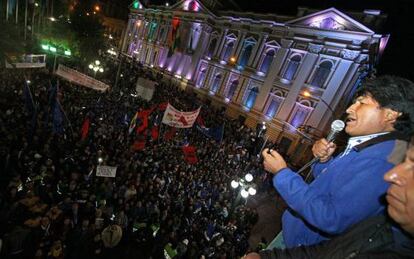Bolivian economic boom propels Morales to victory
High growth, redistribution policies and business accords help spur president to third term

Trying to juggle anti-capitalist rhetoric and pragmatic economic policies, while also pleasing the rich and the poor, the whites, the indigenous and the mestizos, and avoiding the same economic mistakes and wasteful management as the neighboring countries that share your anti-imperialist mantle. That all makes for an incredible cocktail, but it is the key to Evo Morales’ latest election victory. The incumbent president will continue to lead Bolivia for the next five years. If he completes his term, he will become the longest-serving head of state consecutively in office in Bolivian democratic history after 14 years in charge.
With official results still pending, the contenders accepted the victory of the Movimiento al Socialismo (MAS) candidate based on exit polls and flash recounts by contractors hired by the media. According to their projections, Morales received 59.7 to 61 percent of the vote, while his main rival, Samuel Doria Medina (Democratic Union), won 24 to 25 percent. Former president Tuto Quiroga barely pulled in nine percent and ex-La Paz mayor Juan Del Granado and environmentalist Fernando Vargas each drew three percent. The results will allow MAS to maintain the two-thirds majority necessary to control all decisions in parliament. But official numbers have yet to confirm the projections.
Delays in vote counting
Before the elections, the Supreme Electoral Court (TSE) said 70 percent of the votes would be counted on election night and 90 percent would be counted by the next morning. Yet, by noon on Monday, only 2.89 percent had been counted. A spokesperson told EL PAÍS that counting had been stopped because of a system failure and that they could not say when it would resume. TSE has five days to release official results.
The Court's spokesman, Ramiro Paredes, told news agency EFE that some members received "anonymous notices" on their cellphones saying that the system was being hacked. The threat, he said, forced officials to tighten security. Bolivian media repeated this same version.
In a press release, observers from the Organization of American States (OAS) led by former Guatemalan president Álvaro Colom said "the electoral process was conducted with sufficient guarantees to ensure that the ballot reflected the will of the Bolivian people" although the "tabulation, transmission and dissemination of results were extremely slow, stemming from a series of technical and procedural difficulties. The Mission considers it inadvisable to draw final conclusions based on exit polling. On this occasion, given the distance between candidates and the fact that rivals conceded, this was not an important factor, but in a close election, it might be problematic."
On Monday night, TSE announced that 42.5 percent of the votes had been counted. Based on these results, the Tribunal said Morales won 53.7 percent of the votes and Samuel Doria received 30 percent.
The Supreme Electoral Court (TSE) said 70 percent of votes would be counted on election night, but only 2.7 percent were reviewed. The Court cited a technical failure and alleged hacking, creating controversy around the country.
“There is less and less antagonism towards Evo; this government no longer inspires fear,” says analyst Fernando Molina. Though the president earned fewer votes than in 2009 when he won a 64 percent share, Molina considers it a solid victory after nine years in power. There is evidently less polarization: Morales was the most voted candidate in eight of the nine departments. The exception was Beni – one of the states that, together with Pando, Tarija and Santa Cruz – form the so-called Half Moon. “There is a full moon in Bolivia!” the president shouted from the balcony of the presidential palace in La Paz after his big win. Morales also said his party had dealt “a heavy blow” with this latest victory.
His triumph in Santa Cruz has symbolic significance. The economic engine of the nation, the region has been the stronghold of the opposition and an area of tension, especially during Morales’ first term after it demanded more autonomy from the central government in 2008. The administration won the department with a more than 10-point lead over Doria (50.6 percent to 38.1 percent), in large part because of Morales’ rapprochement with Santa Cruz businesses. Despite his rhetoric, the president has applied liberal logic when it comes to business and has adopted the route map corporate leaders proposed to him last year. “His progress in the western part of the country depends on his fulfillment of these promises,” Molina adds.
While Morales built an entente with business leaders, the Bolivian government also developed a series of redistribution policies to bring about the social inclusion of a part of society that had been discriminated against for decades. The measures allowed Morales to stay true to his support base. Over the last nine years, the state offered aid packages to the elderly, pregnant women and students, thus providing assistance to a third of the country’s 10 million people. According to Economy Ministry records, the measures reduced extreme poverty in urban areas by 10 percent (from 24 percent to 14 percent) and by 20 percent (from 63 to 43 percent) in rural areas.
There is less and less antagonism; this government no longer inspires fear,” says one analyst
None of this would have been possible without the economic boom over that period. The economy grew as prices of raw materials and hydrocarbons rose. The resources were discovered under President Jaime Paz Zamora (1989-1993) and Morales developed the sector when he came to power. Unlike other nations in the region that share the same political rhetoric, Bolivia successfully managed its natural resources, leading to exports increasing from $2 billion to $10 billion (€1.6 to €7.8 billion) within a decade. The country holds an unprecedented amount in international reserves: around $15 billion (€11.8 billion).
In Bolivia, employment is almost at 100 percent. According to the Economic Commission for Latin America (ECLA), jobs are expected to grow by 5.5 percent this period, giving the country the best employment projection in the region. Since Morales took office, revenue from oil sales has risen from $300 million a year to a projected $6 billion in total sales this year. In 2013, when the economy grew by 6.3 percent, gas accounted for 54 percent of exports or about $6.6 billion of the nation’s $12 billion in total sales. In order for Bolivia to continue to be a gas producer, the government will have to allocate more resources to exploration – something the administration has not yet done. The nation is currently investing $400 million – a relatively low amount – and only has 10 years’ worth of reserves.
Morales’ strong victory has brought back the debate over unlimited terms. The president has said he will obey the Constitution and Vice President García Linera has said they will not make any changes to it. The current law prohibits a head of state from running for more than two terms. Morales was permitted to run this third time because the government and the Constitutional Court interpreted his 2009 race as a snap election that officially led to his first full term.
Translation: Dyane Jean François
Tu suscripción se está usando en otro dispositivo
¿Quieres añadir otro usuario a tu suscripción?
Si continúas leyendo en este dispositivo, no se podrá leer en el otro.
FlechaTu suscripción se está usando en otro dispositivo y solo puedes acceder a EL PAÍS desde un dispositivo a la vez.
Si quieres compartir tu cuenta, cambia tu suscripción a la modalidad Premium, así podrás añadir otro usuario. Cada uno accederá con su propia cuenta de email, lo que os permitirá personalizar vuestra experiencia en EL PAÍS.
¿Tienes una suscripción de empresa? Accede aquí para contratar más cuentas.
En el caso de no saber quién está usando tu cuenta, te recomendamos cambiar tu contraseña aquí.
Si decides continuar compartiendo tu cuenta, este mensaje se mostrará en tu dispositivo y en el de la otra persona que está usando tu cuenta de forma indefinida, afectando a tu experiencia de lectura. Puedes consultar aquí los términos y condiciones de la suscripción digital.









































